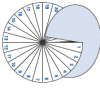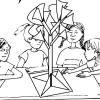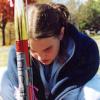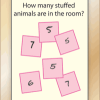Search Results
Showing results 401 to 420 of 502

The Turing Test: Conversations with Computers
Source Institutions
This activity aims to stimulate discussion on the question of whether computers can exhibit “intelligence,” or are ever likely to do so in the future.

Space Elevator
Source Institutions
In this activity, learners imagine what the world might look like if we could build an elevator to space!

Great Steamboat Race
Source Institutions
In this outdoor activity, learners race small boats, made of cork, balsa wood, popsicle sticks etc., to investigate the rate and direction of currents in a stream or creek.

Safe in the Sun
Source Institutions
In this activity on page 13 of the PDF, use a special plastic card that has been painted with a chemical that changes color when it is in UV light.

Sail Car Design
Source Institutions
This activity (on page 3 of the PDF under GPS: Sailboat Design Activity) is a full inquiry investigation into design optimization.

Invent on the Spot
Source Institutions
In this activity, learners design a device to solve a problem: how to get a ball out of a drain pipe.

Algebra: Aw Chute!
Source Institutions
In this math lesson, learners determine and compare the rate of descent of various learner-constructed parachutes. Learners construct parachutes that will have maximum hang times.

Sleep Patterns
Source Institutions
In this activity about sleep rhythms (on page 21 of the PDF), learners will collect data about their own sleep cycles and use a fraction wheel to examine their data.

Community Wind Project
Source Institutions
In this thought-provoking activity, learners plan a hypothetical project to build and operate wind turbines in their community.

Three Bean Salads
Source Institutions
This game teaches ratio and proportion by having learners make "salads" that combine three types of beans in different combinations.

Weather Vane
Source Institutions
In this meteorology activity, learners build weather vanes using straws, paperclips, and cardstock.

Spaghetti Bridge
Source Institutions
Learners explore the field of civil engineering by making a bridge using spaghetti as their primary building material.

Build a Tree
Source Institutions
This activity (on pages 13-18) has learners build a model tree and then figure out how to make their tree stand up by itself.

Low-Tech Water Filter for High-Impact Clean
Source Institutions
In this activity, learners consider the water features they might enjoy at a community park--a pond, brook, water playground (or "sprayground"), or pool--and what happens to the water over time.

Automotive Emissions and the Greenhouse Effect
Source Institutions
In this activity about global climate change, learners will conduct an experiment and collect data to compare the amount of carbon dioxide (CO2) in four different sources of gases.

Lift Off!
Source Institutions
This activity (on page 2 of the PDF under SciGirls Activity: Lift Off) is a full inquiry investigation into the engineering challenges of sending scientific sensors into space.

Up, Up, and Away
Source Institutions
In this math lesson, learners explore the real world meaning of slope. Learners conduct a balloon experiment in which they measure the circumference and flight time of deflating balloons.

2-Liter Landfill
Source Institutions
In this activity, learners gain a better understanding of how household/school waste breaks down in a landfill. Learners collect trash and then create miniature landfills in 2-liter bottles.

Seeing the World Through a Different Lens
Source Institutions
Learners participate in a variety of activities modeling different disabilities.

Count Around
Source Institutions
Learners explore their surroundings while reasoning about categories and counting.
